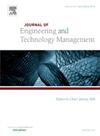通过商业模式创新配置人工智能引导的中小企业可持续竞争优势:系统文献综述方法
IF 3.9
3区 管理学
Q2 BUSINESS
Journal of Engineering and Technology Management
Pub Date : 2025-10-01
DOI:10.1016/j.jengtecman.2025.101921
引用次数: 0
摘要
多年来,研究人员一直在探索一个有效的框架来实现竞争优势,专门为中小企业(SMEs)量身定制,以确保其长期生存。最近先进技术的激增,特别是人工智能(AI),使他们的辩论更具挑战性。因此,该研究提出了一个专门设计的概念框架,旨在利用人工智能在中小企业中获得长期竞争优势,并从这个角度审视他们的商业模式。本研究进行了系统的文献综述(SLR),以涵盖69篇文章的最终样本中广泛的相关文献。选择单反法以系统、透明和可重复性的方式整合研究。在定性分析和框架推导方面,本研究采用主题本体论分析。该研究确定了先进科技与创业相结合的多个研究方向,旨在提高中小企业的竞争力。本研究的主要成果是开发一个全面的商业模式框架,包括外部前因(即市场和行业动态、技术基础设施、政府政策和支持、战略联盟、社会文化因素)和内部前因(数字领导力、动态能力/适应性、企业家心态、数据战略、增长/弹性),最终有助于可持续绩效。实际上,该研究为中小企业主和管理者在商业战略和运营中采用和使用人工智能提供了一个全面的途径。根据结果,中小企业可以实施自动化和机器学习,以简化业务流程,最大限度地减少体力劳动,并提高整体运营效率。本文还讨论了更多的理论和实践意义,以及局限性和未来的方向,揭示了多个理论门户和后续实证工作的议程。本文章由计算机程序翻译,如有差异,请以英文原文为准。
Configuring AI-guided sustainable competitive advantage for SMEs through business model innovation: A systematic literature review approach
Researchers have been exploring an effective framework for achieving competitive advantage for many years, specifically tailored to small and medium-sized enterprises (SMEs) to ensure their long-term survival. The recent surge in advanced technologies, particularly artificial intelligence (AI), has made their debates more challenging. Thus, the study proposes a conceptual framework specifically designed to leverage AI for long-term competitive advantage in SMEs, examining their business models through this lens. This study conducts a systematic literature review (SLR) to cover a broad range of relevant literature within a final sample of 69 articles. The SLR method was chosen to integrate research in a systematic, transparent, and reproducible way. For qualitative analysis and framework derivation, the study draws on a thematic ontological analysis. The study identifies multiple research streams at the intersection of advanced technology and entrepreneurship aimed at enhancing the competitiveness of SMEs. The primary outcome of this study is the development of a comprehensive business model framework, encompassing both external antecedents (namely, market and industry dynamics, technological infrastructure, government policies and support, strategic alliances, socio-cultural factors) and internal antecedents (digital leadership, dynamic capabilities/adaptability, entrepreneurial mindset, data strategy, growth/resilience), ultimately contributing to sustainable performance. Practically, the study provides a comprehensive avenue for SME owners and managers to adopt and use AI in business strategies and operations. Based on the results, SMEs can implement automation and machine learning to streamline business processes, minimize manual labor, and boost overall operational efficiency. More theoretical and practical implications, along with limitations and future directions, are also discussed, revealing multiple theoretical gateways and an agenda for subsequent empirical work.
求助全文
通过发布文献求助,成功后即可免费获取论文全文。
去求助
来源期刊
CiteScore
8.00
自引率
6.20%
发文量
29
审稿时长
>12 weeks
期刊介绍:
The Journal of Engineering and Technology Management (JET-M) is an international scholarly refereed research journal which aims to promote the theory and practice of technology, innovation, and engineering management.
The journal links engineering, science, and management disciplines. It addresses the issues involved in the planning, development, and implementation of technological capabilities to shape and accomplish the strategic and operational objectives of an organization. It covers not only R&D management, but also the entire spectrum of managerial concerns in technology-based organizations. This includes issues relating to new product development, human resource management, innovation process management, project management, technological fusion, marketing, technological forecasting and strategic planning.
The journal provides an interface between technology and other corporate functions, such as R&D, marketing, manufacturing and administration. Its ultimate goal is to make a profound contribution to theory development, research and practice by serving as a leading forum for the publication of scholarly research on all aspects of technology, innovation, and engineering management.

 求助内容:
求助内容: 应助结果提醒方式:
应助结果提醒方式:


